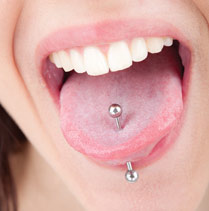How to Help Your Child Develop the Best Habits for Oral Health
From tooth-brushing for your toddler to helping your teenager stay away from tobacco, here are the most important tips for healthy habit formation through childhood and beyond
(Continued)
Healthy Mouth — Healthy Body
Tip 4: If you allow your children to have sugary treats, make sure they are consumed only at mealtimes, not between.
Whatever you eat, it goes through your mouth, and what you put in your mouth has a lot to do with the condition of your teeth. A diet rich in sugar encourages the growth of acidogenic (acid-producing) bacteria, which cause tooth decay. Saliva can help neutralize acid — it takes at least 20-30 minutes — but not if sugar is constantly present in the mouth.
That's why it's important not to snack between meals, especially on sugary foods and drinks, including sodas, sports drinks and fruit juices. These can also fill you up without offering any nutritional benefit.
Not many kids can resist sugar all the time, but it does less damage if consumed at mealtimes. And when your child needs to refuel before the next meal, fresh fruits and vegetables, nuts and cheese, a glass of milk or just plain water, are better choices than a candy bar.
Tip 5: Encourage your children to stop sucking thumbs and pacifiers by age 3.

A Source of Comfort — and Bite Problems
Sucking for comfort rather than nutrition is a completely normal habit for babies and young children. Babies even suck their fingers in the womb. Most children drop the thumb-sucking habit on their own between the ages of 2 and 4. But problems can occur when sucking habits are allowed to go on too long. When children repeatedly suck a finger, thumb or pacifier over long periods of time, their upper front teeth may tip toward the lip or not come into position properly, and development of the upper jaw may be affected.
The American Academy of Pediatric Dentistry recommends that parents or caregivers encourage children to stop sucking thumbs, fingers and pacifiers by age three. Ask your general or pediatric dentist for tips on gentle ways to help your child stop when it's time.
Preventing Injuries to Teeth
Damage to upper front teeth from trauma is the most frequent injury to young children and teens, particularly during contact sports.
Tip 6: Get a professionally made custom-fitted mouthguard for your child.
According to the American Dental Association, an athlete is 60 times more likely to suffer dental harm when not wearing a mouthguard. These devices not only protect the teeth, but also the jawbones, jaw joints and soft tissues of the lip, cheeks, gums and tongue. A mouthguard made specifically for your child using a model of his or her teeth offers greater protection than an off-the-shelf or “boil-and-bite” model, which is softened in boiling water and then formed into the shape of an individual's mouth.
The higher cost of a custom device is more than offset by the reduction in pain, suffering and expensive dental treatment — often for years to come.
Get a professionally made custom-fitted mouthguard for your child or children and make sure they get into the habit of wearing it regularly during all activities that put their mouth and teeth at risk.
Tip 7: Warn your teens about the dangers of oral piercings.

Unhealthy Oral Habits
Oral Piercings — The ubiquity of pierced tongues and lips doesn't mean this trend is harmless. Just as tattoos may be a sign of the times and increasing in use, oral piercings — tongue and lip bolts — create risk for teeth and the tissues that surround them. Resulting tooth problems include chipping, sensitivity, and pain. Periodontal problems (“peri” – around; “odont” – tooth) include gum recession, inflammation, infection, and bone loss. Tongue bolts, in some cases, have even caused nerve damage and can be bloody and painful to place. Fortunately, a hole punctured for this type of piercing usually closes up on its own when the ornament is removed.
As with tattoos, think twice before having a lip or tongue bolt fitted, and get fully informed about the risks first. Make sure these alterations don't become permanent reminders of temporary emotions!
Tip 8: Get professional help if you and/or any of your teenagers have an addiction to tobacco, alcohol or drugs.
Tobacco — Whether smoked or chewed, tobacco is very bad for your oral and your general health. Not only does it stain your teeth, but it also can cause precancerous changes to your mouth that leave you vulnerable to full-blown oral cancer. Peer pressure to look tough, grown-up and cool can push teens to try tobacco. Baseball-playing teens sometimes feel peer pressure to “dip” like the Major Leaguers. Better to chew sugarless gum sweetened with xylitol, which inhibits the growth of decay-causing oral bacteria.
True Addictions
The terms “drug addiction” and “drug dependence” are synonymous; both refer to the behavior of repeatedly ingesting mood-altering substances. The essential features of dependence include a combination of cognitive (what people think), behavioral (what people do), and physiological (effects on the body), symptoms that play a role in continued drug use.
Bad food behaviors (over-eating or indulging) and conditions such as anorexia and bulimia are all habits that have psychological causes, and manifestations. Similarly, alcoholism, tobacco and drug use can all have roots in childhood and teenage years. Help your child develop good, sound, healthy habits early on. If you or your child or teen need help quitting a habit, it may be hard if not impossible to do alone.
Addictions are complex habits to change that require cognitive, behavioral and physiological change, and need specific strategies and professional help to overcome. Talk to your dentist or family doctor for help; don't be shy, afraid or embarrassed, that's what they're there for.

